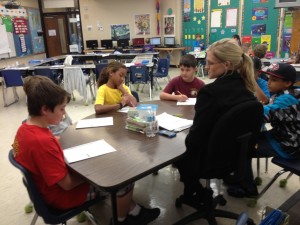
She saw children spread out across classrooms, working with manipulatives. They were playing, but they also seemed to be learning. There wasn’t a worksheet in sight.
“When I saw that, I told my husband, ‘Whether I get that job or not, our kids are going here,'” she said.
She got the job, and her three children left a nearby private school to join her.
While she may not have known it at the time, she was about to join one of the most successful teams of rural educators in Florida.
Looking through state accountability reports, it’s hard to find a school that enrolls as many economically disadvantaged students and matches the academic results of this charter school, which sits a few blocks off the main drag in a small fishing village on Florida’s Forgotten Coast.
State records show 99 percent of the students in the school are economically disadvantaged, and it serves more minority students than the lone public school run by the local Franklin County district. When the most recent round of school grades came out last month, the ABC School received its fourth-straight A. Fewer than a dozen schools in the state achieved a similar feat.
Teachers and administrators say having an assistant in every two classrooms (one per grade level) goes a long way toward explaining the ABC School’s results. The aides allow teachers to do things they couldn’t on their own, working with students one-on-one or in small groups. They help prepare weekly reports on student learning, and can present material in different ways, doubling the chances lessons will click with students.
The aides help overcome another challenge rural and small-town schools face: Recruiting qualified teachers. After four years as an aide and two years substituting, Cassidy began teaching middle school math this year. Chimene Johnson, the principal, said it’s fairly common for assistants to make that jump.
Teachers at the school feel so strongly about the assistants that they’ve made sacrifices to keep them around. Amid statewide budget cuts in the wake of the Great Recession, Johnson said, the staff faced a choice: Give up dental insurance, or cut back on teaching assistants. Teachers opted to pay for their own cleanings and fillings that year, “hands down.”
“We began to see the growth and progress from having that extra person” in classrooms, she said.

The ABC School was founded in 2001 by a group of parents who sent their children to the same preschool, and wanted a new option for their children once they started kindergarten. Elizabeth Kirvin, an assistant principal at the school, said many of the families knew a private school would be out of reach. They envisioned “a public school, open to all students” — including those with special needs. In 1999, they began holding meetings, getting advice from Tallahassee’s School of Arts and Sciences, and preparing to apply for a charter.
In its early years, the school operated in portable classrooms on 10 acres of land donated by the St. Joe Company, a former timber giant with vast real estate holdings in Northwest Florida. When the K-5 charter school tried to expand into the middle grades, it was rebuffed by the local school board and had to appeal to the State Board of Education. At the time, it was a rated a D.
Since then, academic ratings and relations with the school board have improved. When the district consolidated all its schools into a single building, the ABC school bought a newly vacant facility from the district for $1, and took a long-term lease on the surrounding land. Franklin County is one of just five school districts in the state that shares facilities funding with its charter school.
In a rural district with just over 1,000 public-school students, finances can be tight. Johnson said the charter school and the district coordinate the number of students they will enroll each school year, so neither takes an unexpected financial hit.
But she said one factor, above all, helps explain the district’s support for its community’s only charter school: “They see that we’re making a difference with our students.”


